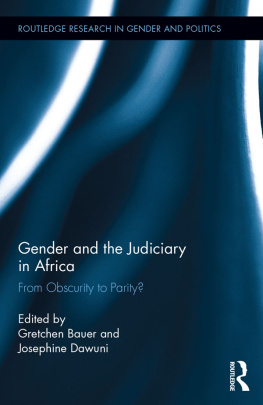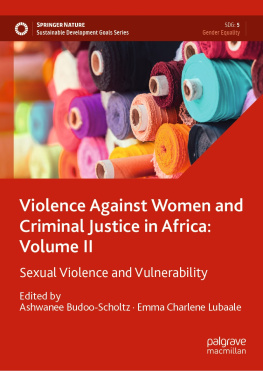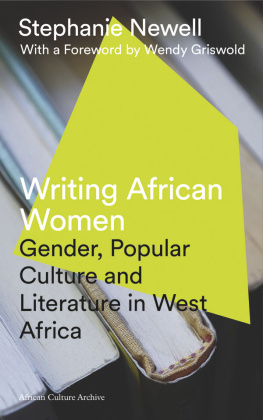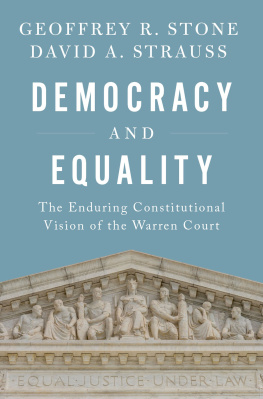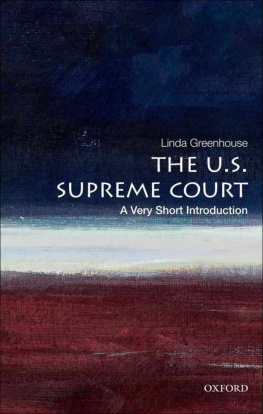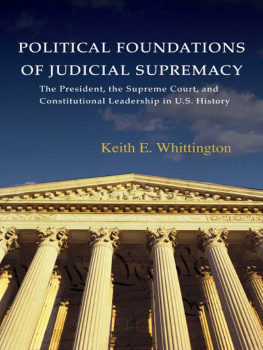At last, African women judges receive the careful scholarly attention they deserve. This work underscores the centrality of the third branch of government in democratization. The authors careful following of a common protocol allows both valuable comparisons as well as solid introductions for the country specialist and novice alike. While the authors review no simple answers to the puzzle of significant country-to-country variation, happily, they analyze how to increase womens representation rather than replaying tired essentialist arguments about difference. Perhaps African feminists will inspire the rest of the world to demand a diverse and representative judiciary? A must read for anyone interested in comparative politics, African politics, women and politics, or judicial politics.
Sally J. Kenney, Newcomb College, USA
This volume offers a fascinating and timely look at the changing role and status of women in Africas judicial systems. Covering a large and diverse collection of countries, the chapters provide deep and sophisticated analyses of the factors shaping patterns of gender representation in judiciaries, the legal, institutional and societal impacts of greater representation for women, and the ongoing challenges facing that project. The book will be of interest to those concerned with comparative judicial development, gender politics, and patterns of change and continuity in African politics and society.
Peter VonDoepp, University of Vermont, USA
Gender and the Judiciary in Africa
Across Africa over the last two decades, nearly two dozen women have been appointed head of the highest court in the land in a range of countries either as chief justice in common law countries or president of the constitutional court in civil law countries. In most cases, these appointments were a first in terms of the gender of the office holder. At the same time, women are being appointed in record numbers as magistrates, judges and justices across the continent. While womens increasing numbers and roles in African executives and legislatures have been addressed in a burgeoning scholarly literature, very little work has focused on women in judiciaries. This book addresses the important issue of the increasing numbers and varied roles of women judges and justices, as judiciaries evolve across the continent.
Scholars of gender and politics and African politics provide overviews of recent developments in gender and the judiciary in nine African countries that represent north, east, south and west Africa as well as a range of colonial experiences, postcolonial trajectories and legal systems, including mixes of common, civil, customary, or sharia law. In the process, each chapter seeks to address the following questions:
- What has been the historical experience of the judicial system in a given country, from before colonialism until the present?
- What is the current court structure and where are the women judges, justices, magistrates and other women located?
- What are the selection or appointment processes for joining the bench and in what ways may these help or hinder women in gaining access to courts as judges and justices?
- Once women become judges, do they promote the rights of women through their judicial powers?
- What are the challenges and obstacles facing women judges and justices in Africa?
Timely and relevant in this era in which governmental accountability and transparency are essential to the consolidation of democracy in Africa and when women are accessing significant leadership positions across the continent, this book considers the substantive and symbolic representation of womens interests by women judges and the wider implications of their presence for changing institutional norms and advancing the rule of law and human rights.
Gretchen Bauer is professor of political science and international relations at the University of Delaware, USA. Her current research focuses on womens political leadership in sub-Saharan Africa. She is the co-editor with Manon Tremblay of Women in Executive Power: A Global Overview (2011) and with Hannah Britton of Women in African Parliaments (2006).
Josephine Dawuni is an assistant professor of political science at Howard University, USA. Her current research focuses on women and the judiciary in sub-Saharan Africa.
Routledge Research in Gender and Politics
1.The Womens Movement in Protest, Institutions and the Internet
Australia in transnational perspective
Sarah Maddison and Marian Sawer
2.The Politics of Gender Culture under State Socialism
An expropriated voice
Hana Havelkov and Libora Oates-Indruchova
3.Maternal Transition
A North-South politics of pregnancy and childbirth
Candace Johnson
4.The Principles of Gender-Sensitive Parliaments
Lena Wngnerud
5.Gender and the Judiciary in Africa
From obscurity to parity?
Edited by Gretchen Bauer and Josephine Dawuni
First published 2016
by Routledge
711 Third Avenue, New York, NY 10017
and by Routledge
2 Park Square, Milton Park, Abingdon, Oxon OX14 4RN
Routledge is an imprint of the Taylor & Francis Group, an informa business
2016 Taylor & Francis
The right of the editors to be identified as the author of the editorial material, and of the authors for their individual chapters, has been asserted in accordance with sections 77 and 78 of the Copyright, Designs and Patents Act 1988.
All rights reserved. No part of this book may be reprinted or reproduced or utilized in any form or by any electronic, mechanical, or other means, now known or hereafter invented, including photocopying and recording, or in any information storage or retrieval system, without permission in writing from the publishers.
Trademark notice: Product or corporate names may be trademarks or registered trademarks, and are used only for identification and explanation without intent to infringe.
Library of Congress Cataloging-in-Publication Data
Gender and the judiciary in Africa : from obscurity to parity? / edited by Gretchen Bauer and Josephine Dawuni.
pages cm. (Routledge research in gender and politics)
Includes bibliographical references and index.
1.Women judgesAfrica.I.Bauer, Gretchen, 1959 editor. II.Dawuni, Josephine, editor.
KQC51.G46 2016
347.6'014082dc23
2015021637
ISBN: 978-1-138-85649-3 (hbk)
ISBN: 978-1-315-71960-3 (ebk)
Typeset in Times New Roman
by Apex CoVantage, LLC
In Memoriam
My mother, Merry Jo Bauer, who raised us to be strong
Gretchen
The wonderful women in my life who taught me to love and persevere: my grandmother Maayi, my mother Mercy, and my sister Bernice
Josephine

